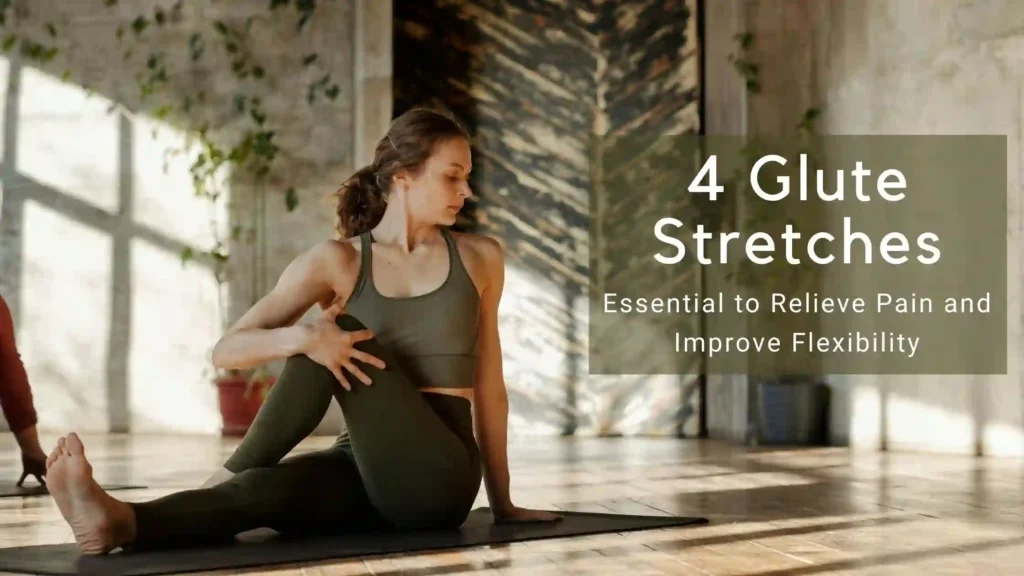Your glutes play a crucial role in mobility, posture, and strength. Whether you’re an athlete, an office worker, or dealing with lower back pain, glute stretches can help relieve tension, improve flexibility, and enhance performance.
In this guide, you’ll learn:
- Why glute stretches are important
- Signs that your glutes are tight
- The best glute stretches for pain relief and mobility
- How to incorporate stretching into your routine
Why Are Glute Stretches Important?
Your glute muscles (gluteus maximus, medius, and minimus) support:
• Pelvic stability – Helps maintain hip alignment and posture
• Lower back health – Reduces strain on surrounding muscles
• Movement efficiency – Enhances walking, running, and sports performance
Key Benefits of Glute Stretches
Increased Flexibility – Improves range of motion for daily activities and workouts
• Pain Relief – Reduces lower back, hip, and knee discomfort
• Better Posture – Counters prolonged sitting and sedentary habits
• Improved Performance – Reduces injury risk and boosts mobility
Tight glutes can lead to lower back pain, hip discomfort, and knee issues. If you experience any of these, it’s time to start stretching!
Signs You Need to Stretch Your Glutes
How do you know if your glutes are too tight? Watch for these symptoms:
• Lower back pain after sitting for long hours
• Difficulty squatting deeply or maintaining posture
• Hip stiffness in the morning or after inactivity
• Pain when climbing stairs or doing cardio
If these sound familiar, start incorporating glute stretches into your routine.
The Best Glute Stretches for Tight Muscles
These stretches help loosen tight glutes, relieve pain, and improve flexibility.
1. Pigeon Pose (Hip Glute Stretch)
Best for: Deep glute and hip flexibility
- Start on hands and knees
- Bring your right knee forward behind your right hand
- Extend your left leg straight back
- Lower your hips and hold for 30 seconds
- Switch sides
Tip: If your hips are tight, place a yoga block under your hip for support.
2. Figure-Four Stretch (Glute Stretches for Lower Back Pain)
Best for: Lower back and glute tension relief
- Lie on your back with knees bent
- Cross your right ankle over your left knee
- Pull your left thigh toward your chest
- Hold for 30 seconds, then switch sides
3. Seated Spinal Twist (Glute Medius Stretch)
Best for: Glute medius activation and spinal mobility
- Sit with legs extended
- Cross your right leg over your left, foot flat on the floor
- Twist your torso to the right, placing your left elbow outside your right knee
- Hold for 20–30 seconds, then switch sides
4. Child’s Pose with Side Stretch (Dynamic Glute Stretch)
Best for: Gentle glute release and hip mobility
- Start in a tabletop position, then sit back on your heels
- Extend arms forward, forehead resting on the mat
- Shift hands to the right for a deeper stretch in the left glutes
- Hold for 20 seconds, then switch sides
How to Make Glute Stretches a Daily Habit
For the best results, include these stretches in your routine:
- Morning Routine: Wake up with gentle stretching
- Post-Workout: Use as a cool-down to relax muscles
- Work Breaks: Stretch throughout the day to counteract sitting
Common Stretching Mistakes to Avoid
- Skipping Warm-Up – Always warm up before deep stretching
- Forcing the Stretch – Never push past discomfort
- Inconsistency – Stretching once in a while won’t yield results
Beyond Flexibility: Additional Benefits of Glute Stretches
- Improved Circulation – Enhances oxygen and nutrient delivery
- Reduced Stress – Releases hip tension linked to emotional stress
- Better Athletic Performance – Supports agility and power in workouts
Creating a Personalized Glute Stretching Plan
- Frequency: At least 3 times a week
- Duration: Hold each stretch for 20–30 seconds
- Focus Areas: Spend extra time on tight or sore areas
Final Thoughts: Make Glute Stretches a Priority
By prioritizing glute stretches, you can significantly improve mobility, reduce pain, and enhance movement. Whether you’re an athlete, a desk worker, or dealing with stiffness, these glute stretches will keep your muscles strong and flexible.
Start incorporating these stretches today for a healthier, pain-free body!
FAQs About Glute Stretches
Q: How long does it take to see results from glute stretches?
• Consistent stretching can show improvements within 2–4 weeks.
Q: Should I stretch my glutes every day?
• Yes! Daily stretching is safe and helps prevent tightness.
Q: What’s the best time to do glute stretches?
• After workouts or throughout the day, especially if you sit for long hours.
Q: Can glute stretches help with lower back pain?
• Absolutely! Tight glutes often contribute to lower back discomfort. Stretching helps relieve tension.
Q: Are glute stretches safe during pregnancy?
• Many are safe, but consult your doctor before starting a new routine.

